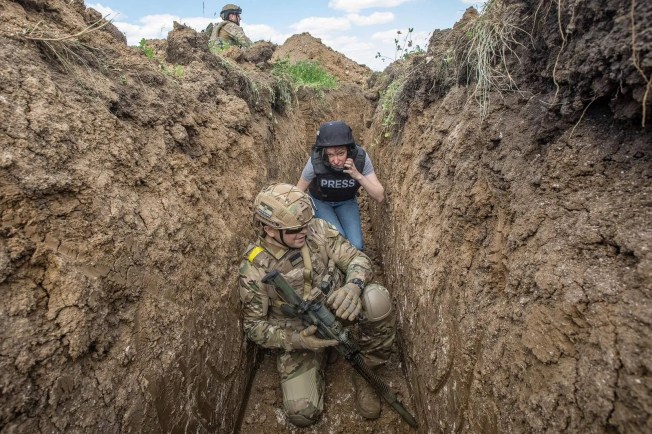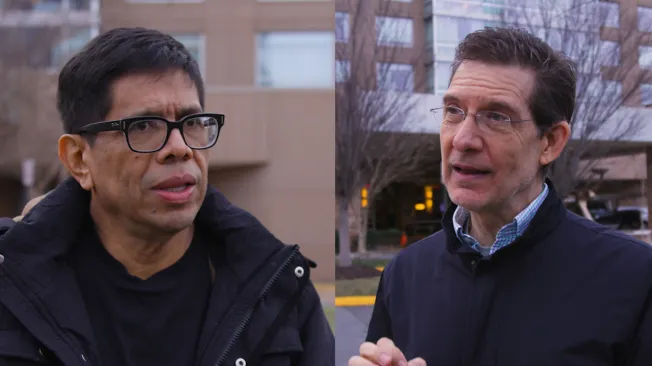Covering the Russia-Ukraine war one year on: A Q&A with Europe and Central Asia Researcher Anna Brakha

In the year since it started, Russia’s brutal, full-scale invasion of Ukraine has taken a painful toll on the press. At least 13 journalists have been killed covering the war and CPJ is investigating whether the deaths of two others were related to their journalism. Beyond Ukraine, the collapse of independent media in Russia–where calling the war a “war” became a crime–has forced journalists into exile. For this edition of Insider, we spoke with CPJ Europe and Central Asia Researcher Anna Brakha about the war, and what CPJ is doing to help.
How has covering the Ukraine war changed over the last year for journalists?
Journalists reporting on the war have faced many evolving threats over the past year, whether they were working on the front lines, forced to leave Ukraine for their safety to carry on their work, or fleeing Russia for fear of persecution for covering the conflict.
When Russia launched its full-scale invasion of Ukraine on February 24, 2022, many Ukrainian and foreign journalists lacked protective equipment and war reporter training. Newsrooms were unprepared to cover a conflict of this magnitude and lacked the human capacity to provide the crucial rotation needed to mitigate the fatigue and psychological impact of frontline reporting. This explains, in part, why most of the killings of journalists occurred in the early weeks and months of the war. As the authorities set more and more rules for working on the front lines and the conflict gradually turned into a war of attrition punctuated by high-intensity military action, newsrooms adapted to better protect their journalists.
The war uprooted hundreds of Ukrainian journalists, whether they were forced to leave the country or relocate internally. Many of those who left have since returned to Ukraine. While the front line has gradually become more discernible, they are still at great risk as Russian artillery continues to hit Ukrainian cities throughout the country. In addition, repeated Russian air strikes on Ukrainian energy infrastructure make it technically difficult for journalists to work and result in an urgent need for generators. And the psychological burden of covering the conflict has progressively added to safety concerns.
For Russian journalists, covering the realities of the war in Ukraine has been de facto outlawed, with Russian lawmakers criminalizing “false” information about the country’s military. Russian authorities have sought to stamp out independent reporting on the conflict, by prosecuting, fining, and detaining journalists for covering the war, as well as forcing newsrooms to shut down or stripping them of their licenses. As of February 8, 2023, more than 10,000 websites were blocked due to war-related censorship.
How has CPJ had to pivot over time to stand with the press? How has CPJ been able to help those covering the war–whether on the ground in Ukraine or elsewhere?
In addition to scrupulously documenting war-related abductions, injuries, and killings of journalists, as well as the large-scale crackdown on independent media in Russia, CPJ has remained vigilant about measures that threatened to limit press freedom in the context of martial law in Ukraine and has been calling on Ukrainian authorities not to arbitrarily revoke journalists’ accreditation or adopt legislation that might restrict press freedom, and to investigate harassment of journalists for their reporting.
Over the past year, CPJ has provided different types of support to journalists covering the war. CPJ partnered with medical supplies company Medtrade and Ukrainian news outlet Zaborona, to distribute hundreds of first aid kits and gauze that stop bleeding in 60 seconds. CPJ also worked to distribute crucial safety advice, including information on how to work in environments containing unexploded ordnance (UXO) and a guide to bringing personal protective equipment (PPE) into Ukraine, set up a WhatsApp chatbot to help journalists with safety information, and issued a guide to understanding Russia’s “fake news” laws. Finally, CPJ also provided financial and non-financial assistance to more than 200 journalists affected by the war.
What is CPJ anticipating for journalists covering the war as it moves into its second year–and how is CPJ prepared to act?
As the conflict enters its second year, CPJ expects that journalists covering the war will continue to face tremendous challenges, whether legal or financial, or in relation to their physical safety or mental health.
Many news organizations have been forced to suspend operations temporarily or permanently. Those remaining must work to rebuild and attract funding to continue covering the conflict.
As the war lingers, CPJ expects Ukrainian news outlets to gradually move away from informational support for the authorities and the military, embodied by the national telethon, and deepen their coverage of other topics, while becoming more critical and scrupulous of the government’s actions, which could lead to increased pressure from the authorities and the public.
CPJ expects Russian authorities to keep silencing any independent reporting on the war, by prosecuting and arresting journalists, or adopting more restrictive laws and retaliatory measures against those in exile. Particular attention should be paid to actions that may be taken regarding YouTube and Telegram, two key uncensored nests of press freedom remaining in the country. CPJ is committed to keeping the conflict from drifting out of the headlines and will continue to call for accountability and investigation of attacks involving journalists. CPJ will stand ready to assist journalists, with an emphasis on trauma support.
Nicaragua releases and deports 7 journalists and media workers

After Nicaragua recently released and deported 222 political prisoners to the U.S., CPJ Central America Correspondent Dánae Vílchez, herself an exiled Nicaraguan journalist, traveled to Virginia to greet the seven journalists and media workers who were among them.
CPJ stepped up to provide these journalists with the crucial information they will need as they begin their lives as exiles, as well as emergency funds to cover basic costs for housing, food, and other needs.
Being a helping hand for journalists in crisis has been part of CPJ’s work for more than 40 years. Check out our conversation with two of the journalists–La Prensa’s Juan Lorenzo Holmann and veteran sports journalist Miguel Ángel Mendoza Urbina–on what is a bittersweet freedom:
Must-reads
CPJ Turkey Representative Özgür Öğret spoke with Kurdish journalist Nedim Türfent in a recent Q&A about the six and a half years the journalist spent behind bars as a convicted terrorist for what the court said was “exaggerated and disturbing news stories.” When asked whether the newly released journalist would return to working in journalism, he responded, “There is no option to not practice journalism. Our profession is our pride; we will not drop the pen because we paid a little penance for it.”
CPJ Consultant Technology Editor Madeline Earp speaks with CPJ Senior Researcher Yeganeh Rezaian and other journalists and experts in a feature exploring the seizure of detained journalists’ devices in Iran. Of the 95 journalists arrested there since protests erupted last September, more than half have had their devices seized. “My only worry,” Rezaian said of her own arrest in 2014, “was that I didn’t want any of my friends and family [to] get in trouble…I kept whispering to myself, ‘I wish I never saved any phone numbers.’”
CPJ joined a press freedom delegation on a mission to Slovakia and, in a joint letter to authorities, called for full justice in the murders of journalist Ján Kuciak and his fiancée, Martina Kušnírová, who were both killed five years ago. “The end of impunity must become a reality,” the letter demands, “and the new political cycle must be turned by political parties into an opportunity to strengthen press freedom.”
CPJ in the news
“‘Like going to the war front’: Nigerian journalists offer tips for covering 2023 elections,” Daily Trust
“NPR asks Iran’s foreign minister about anti-government protests and global relations,” NPR
“Deadly start to year in Africa with threats, killings of critics,” VOA
“Cameroonian businessman arrested after journalist’s murder,” Reuters
“Why Maharashtra journalist’s murder reflects poorly on status of press freedom in India,” Newslaundry
“Indian tax agents raid BBC offices in wake of Modi documentary,” Al-Jazeera
“Story Killers: Insider the deadly disinformation-for-hire industry,” Forbidden Stories
“An environmental activist found dead in the municipality of Tula, Hidalgo,” El País
“Media covering devastating quake in Turkey report restrictions,” VOA
“These women journalists were doing their jobs. That made them targets,” The Washington Post
This content originally appeared on Committee to Protect Journalists and was authored by Committee to Protect Journalists.
Committee to Protect Journalists | Radio Free (2023-02-24T15:56:52+00:00) CPJ Insider: March 2023 edition. Retrieved from https://www.radiofree.org/2023/02/24/cpj-insider-march-2023-edition/
Please log in to upload a file.
There are no updates yet.
Click the Upload button above to add an update.